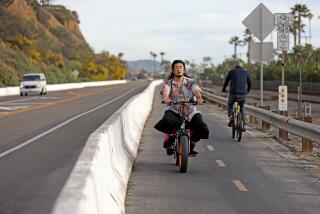A Pedal Policy in Berkeley
- Share via
BERKELEY — City policy here can sound like a 1960s folk song: This land is your land, wear the union label, give peace a chance. So if a plan to cede City Hall mail delivery to a fleet of activist bike messengers passes official muster this summer, consider it business as usual.
This is Berkeley, after all. City leaders have launched scores of boycotts, passed union-first laws and hewed to environmentally friendly policies. If all goes smoothly--and this is Berkeley, so no guarantees--home-grown Pedal Express will handle most of City Hall’s mail by July 1, the start of the new fiscal year.
“The two biggest complaints we hear about Berkeley are the lack of housing and the immense amount of traffic,” said Kriss Worthington, a City Council member who avidly supports increasing the city’s share of pedal-powered mail deliveries.
“The city delivers a lot of information, including to [the City Council] in the form of late reports that they race over to our houses so we can read them immediately,” Worthington said. “It would be quite wonderful to deliver all of those pieces of paper instead of by car--it would make a difference to air quality and to traffic.”
Pedal Express, an owner-operated cooperative that grossed $100,000 last year, already handles a sizable chunk of city mail. After the U.S. Postal Service makes its daily drop at a city mail room, cyclists sort and distribute the material to 11 municipal departments throughout the city. (If full service is approved, Pedal Express will make pickups directly from a Postal Service substation.) Bulky or heavy loads call for the specially engineered Tri-Hauler, a recumbent bike that can haul up to 700 pounds on sturdy trailers.
The 7-year-old company’s cyclists deliver 500 to 1,000 letters, packages and documents each week, said Shane Rhodes, a member/owner of the cooperative. If the company lands the city contract, its volume of mail will more than double.
“Right now, we make about 26 trips a day with city mail,” Rhodes said. “That means we’ve eliminated the pollution and traffic from the cars that would have been delivering that mail.”
State officials said every little bit counts.
Short trips, disproportionately high in pollutant emissions, make up more than 50% of daily automobile use in the state, according to the California Department of Transportation. Cyclists already on the road in California keep about seven tons of smog-forming gases out of the atmosphere.
“Any time you can cut down on driving any kind of conventionally fueled motor vehicle, whether it’s gas or diesel, it cuts down on pollution,” said Gennet Osborn, a spokeswoman for the California Air Resources Board. “If everyone realized how much impact they have on air quality, they might change their behavior.”
Berkeley has long taken this sense of duty to heart with a brand of activism outsiders see as fearless and foolish. Four years ago, the city’s extensive list of boycotts meant city cars couldn’t gas up at Mobil, Texaco, Chevron, Arco, Shell or Exxon. Another boycott briefly left break-room vending machines without cola drinks.
That same sense of civic duty led residents to tax themselves to provide a wide range of public services. In the post-Proposition 13 era, during which most California cities have cut back services, Berkeley has thrived. In the last 30 years, city voters have approved ballot measures to pay for everything from parks and public schools to extensive services for homeless and indigent residents.
And hired cyclists to deliver the mail.
“They don’t pollute, they use renewable resources, and we really want to encourage bicycle use in the city,” said Dona Spring, a City Council member who wants Pedal Express to handle even more city mail. “When the city has a chance to work with an organization like this, I think we need to go for it.”
Easier said than done.
Switching to Pedal Express means reconciling conflicting city policies. Comply with one--don’t use outside contractors for work that could be done by city employees--and mail delivery remains a city task. Obey another--be environmentally sensitive--and Pedal Express gets the job.
On top of that, Berkeley has a no-layoff policy, and would not enter into a business arrangement that would cut or compromise union jobs.
“That makes it a bit more complicated, but when we get a formal proposal from Pedal Express we’ll be able to address all the issues,” said Fran David, Berkeley’s finance director. “At this point, the only other option would be making city employees ride bikes, and I don’t see how we could do that.”
More to Read
Sign up for Essential California
The most important California stories and recommendations in your inbox every morning.
You may occasionally receive promotional content from the Los Angeles Times.













